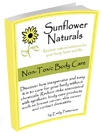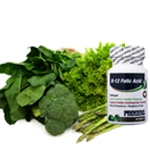Folic acid, the synthetic form of folate, has been added to our food supply since 1988 to reduce deficiency in pregnant women to reduce the risk of neural tube defects in their babies and to help block the effects of bisphenol A. Pregnant women are now bombarded with folic acid in supplements, prenatal vitamins and fortified foods in addition to sources of natural folate. However, it is important to know that too much folic acid may cause other problems such as impaired renal function, permanent nerve damage and a new study has shown that there is an association with excessive folic acid exposure in the womb to increased risk of developing asthma and autism. Folic acid, the synthetic form a folate, a nutrient found in green vegetables such as peas and spinach, citrus fruits and beans. Studies were done with folic acid, not folate.
Many people do not realize that folic acid and folate are two different things. The National Institutes of Health Dietary Supplement Fact Sheet on folate explains that folic acid is a synthetic form of folate. While both are called 'B9', folic acid is created in a lab and folate is found in leafy green vegetables (like spinach and turnip greens), fruits (like citrus fruits and juices), and dried beans and peas.
Quite a few studies show that folic acid is beneficial during pregnancy to reduce the risk of neural tube defects. The recommended amount of folic acid during pregnancy is 600 micrograms, or just over half a milligram. This is the equivalent of around 1 ½ bowls of cereal that is 100% fortified with folic acid per serving. A full table of sources of folic acid is located here: The National Institutes of Health Dietary Supplement Fact Sheet on folate.
In addition to reducing the risk of neural tube defects, recent studies show that prenatal folic acid reduces the risks of reproductive developmental birth defects caused by exposure to BPA while in the womb, such as hypospadias, undescended testicles and mammary abnormalities in males and females. The question remains if adequate folic acid reduces the risk of DNA damage resulting in increased risk of developing future breast cancers associated with exposure to BPA while in the womb.
|
|
However, too much folic acid appears to have associated risks. Prenatal vitamins often include 100% or more of the daily recommended amount of folic acid, 600 micrograms. Many prenatal vitamins include well over 1 gram of folic acid or more, which is above the upper limit for folic acid during pregnancy set by the National Institutes of Health. This folic acid supplementation is in addition to folic acid fortified foods, such as grains, and foods which contain natural folate such as spinach. Emerging studies are showing a correlation between high folic acid intake and respiratory effects, such as development of wheeze, asthma and upper respiratory infections in children less than 18 months. While one study suggests that excessive folic acid intake during the first trimester is associated with the increased risk of autism.
Folic acid is required by the body for periods of rapid cell growth and division, such as during pregnancy. Cancer cells also use the enzymes created by synthesis of folic acid for cell division. Anti-foliates, such as methotrexate, are often given during chemotherapy to inhibit enzymes that process folic acid, which leads to inhibited production of proteins, DNA and RNA required for cell division.
It is important for everyone, especially women who are pregnant or nursing, and those with cancers, to know how much folic acid they receive from all sources. Be sure to include supplements, foods and fortified foods to prevent both deficiencies and excesses and maintain their consumption of folic acid to the proper range for their age, gender and medical conditions as recommended by the National Institutes of Health.
|



